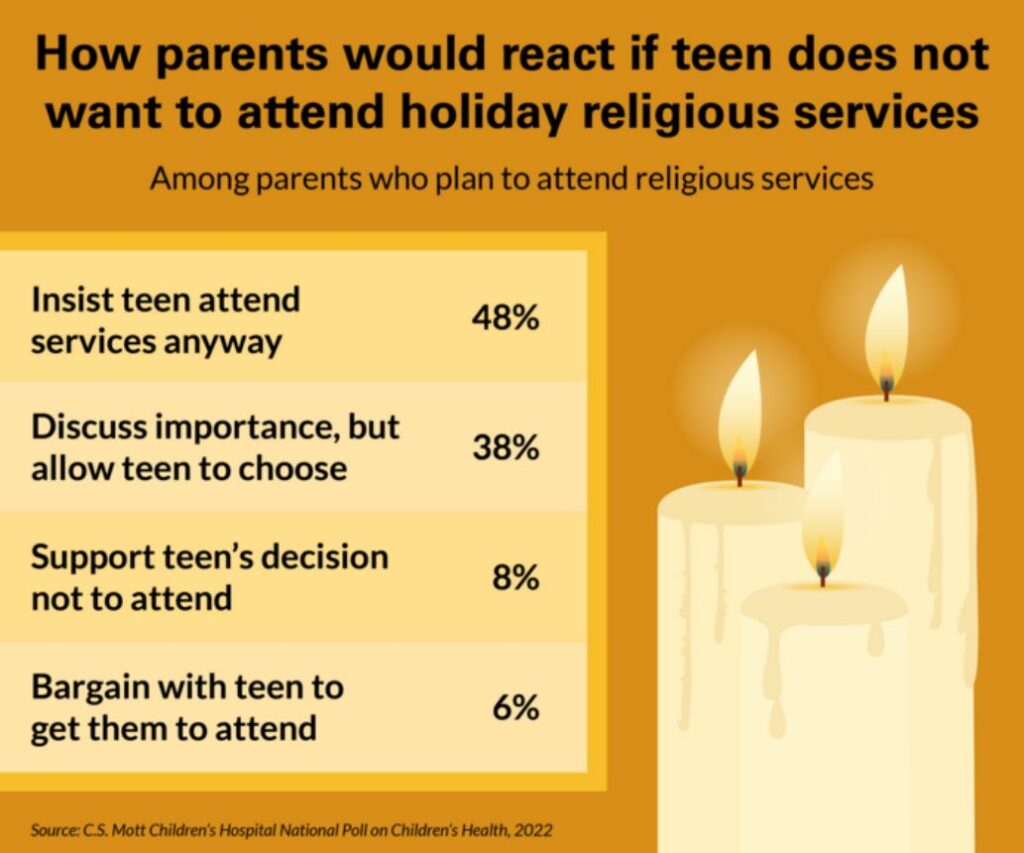“This may trigger tension and conflict in some families when opinions about spirituality clash, especially during the holidays.”
Certain families may observe holiday traditions that involve attending midnight mass, participating in synagogue services, or engaging in other religious rituals during the holiday season.
However, issues may arise when teenagers show a decrease in interest in religious activities compared to when they were younger children.
In a new national poll, half of the parents say they don’t mind if kids and teens decide for themselves whether or not to go to religious services. However, 44% say that kids shouldn’t be able to decide until they’re at least 18.
The results of this study have been published in the most recent report from the C.S. Mott Children’s Hospital National Poll on Children’s Health at the University of Michigan Health.
“Adolescence is a time when youth gain more independence in their beliefs and lifestyle choices, including whether to embrace their family’s faith traditions,” points out Mott Poll co-director and Mott pediatrician Susan Woolford, M.D. “This may trigger tension and conflict in some families when opinions about spirituality clash, especially during the holidays.”
This nationally representative poll was conducted by surveying 1,090 parents who have at least one child between the ages of 13 and 18, and the data were collected between August and September 2022.

Of the parents who intend to attend religious services during the holiday season, nearly half would require their teenager to join them even if the teenager is not interested, while two in five would talk to their teenager about the importance of attending but ultimately allow them to make their own decision. Only a small percentage (less than 10%) of these parents would support their teenager’s decision not to attend or try to negotiate with them to go to the service.
Most parents were satisfied with their teenager’s level of involvement in religious activities, but more than one-third of them wished that their teenager would participate more in religious services and activities.
Three-fourths of parents also concur that involvement in religious services helps young adults establish a connection with their family history and traditions.
“Parents may connect religion with their family traditions, which might be why they may wish to share these experiences with their kids,” Woolford adds. “When teens don’t show interest or even express disdain for attending religious services, parents may feel like it’s a rejection of their cherished traditions.”
Overall, most parents think that having a relationship with a higher power makes teens feel safe and secure and has a positive effect on their overall health. This is in line with research that shows that spiritual practices during adolescence are linked to better health as an adult.
However, only one-third of parents report that their teenager regularly attends religious services with the family.
“Parents should be cautious about how hard they push teens who protest participating in spiritual activities. If adherence is achieved by force, that could diminish any positive effects of participation,” adds Woolford.
“Parents who would like their children to share their religious beliefs should try to find a balance between conveying their values and pressuring teens to conform.”
Most parents, though, think that teens can have a spiritual life without being part of an organized religion.
Woolford suggests that if parents and teens don’t agree on religion, families might look for other ways to grow spiritually, such as:
Parents should be willing to listen and try to figure out why their teen thinks differently than they do about going to religious services. It’s beneficial to give young people room to ask questions about religion and spirituality, and to be honest with them when we don’t have all the answers ourselves.
Parents might be able to find areas where they agree with their teens if they listen to what they have to say.
“This may help teens to find an authentic spiritual relationship that is best for them,” Woolford adds.
Parents could try to find a middle ground by giving teens a choice about some important family religious traditions.
Teens could, for example, be allowed to skip weekly services but still have to follow other rules of the family religion.
Think about how you can show your spirituality outside of church or other formal settings: Many faiths put a high value on helping the community, working for social justice, and protecting the environment.
Families can practice spirituality in other ways during the holidays, like by helping out at a nursing home, serving food at a homeless shelter, or working in a community garden.
“Focusing on the spirit of the season and allowing teens some flexibility with how they engage with family traditions and religious services may decrease conflict over the holidays,” Woolford adds.
